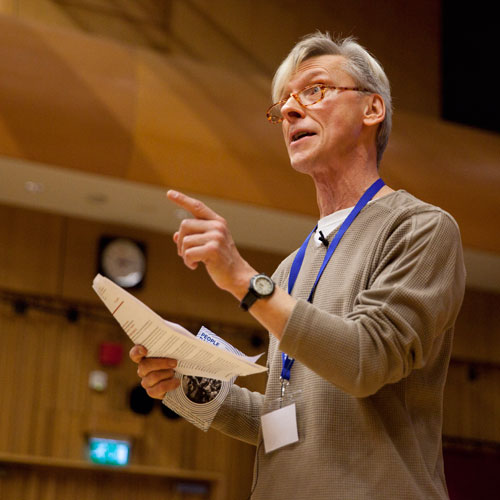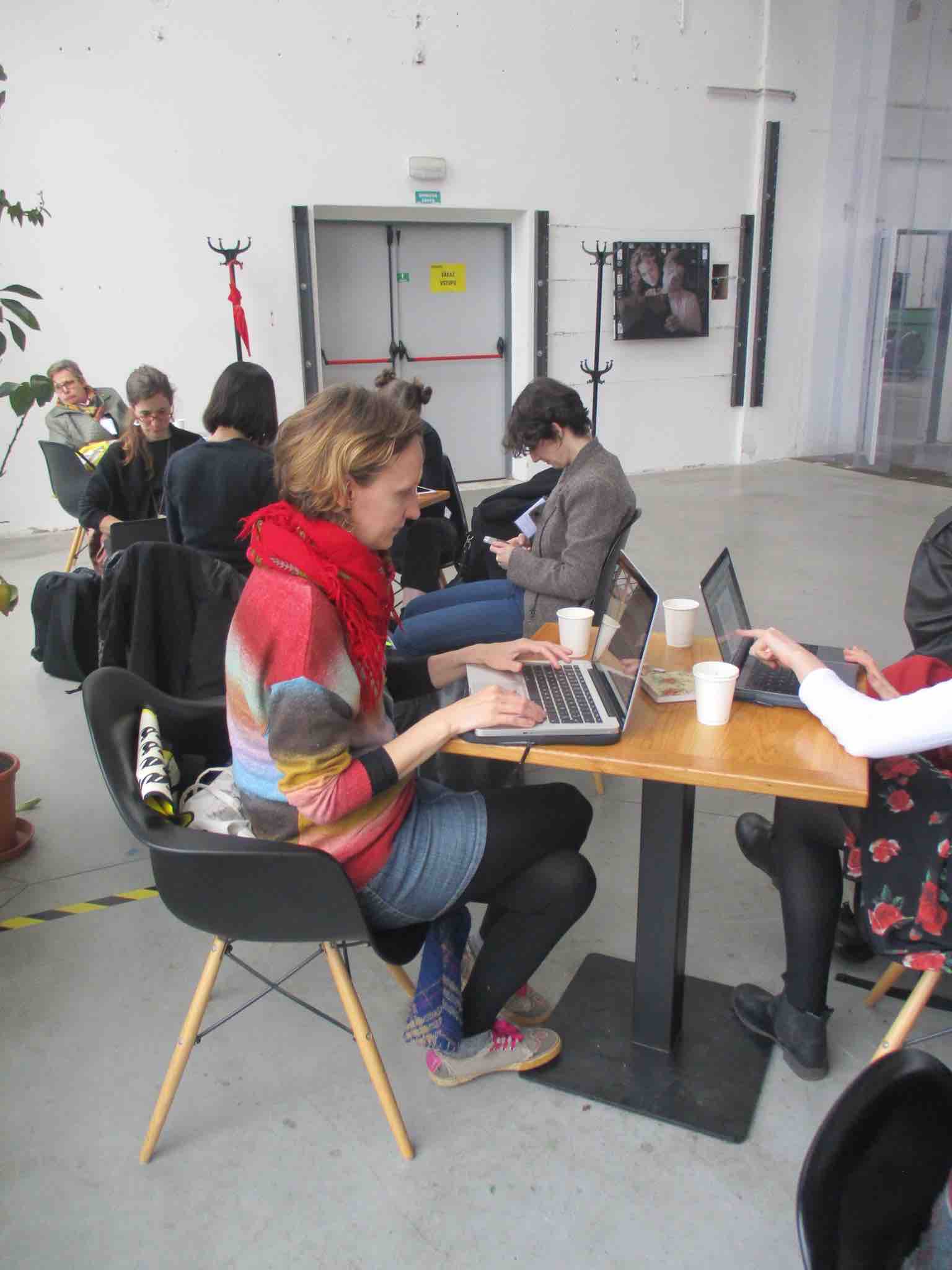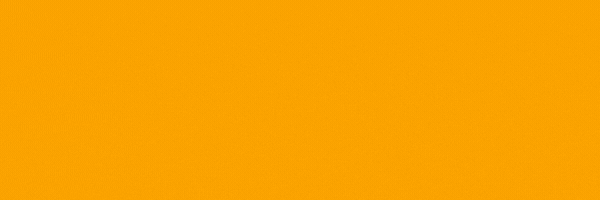Aerowaves Spring Forward: 3 questions for Donald Hutera and Riikka Laakso
Donald Hutera How do you feel about new generations of writers? Do you think that they have potential? What are your visions when you are working with them? I have done it three years in a row from the first pilot went on in Sweden to Spain last year and now in the Czech Republic, completely international European group, various backgrounds and various degrees of readiness to do this. Well let me correct that, they are very ready to do this but they are learning how to do it well, and very significantly they are learning how to do it in English, the international language. I think all three groups have been differently talented and for me the personal satisfaction besides liking to work with young writers is to raise the level of critical discourse. I learn a lot doing this. I think always in teaching situation if the so-called teacher isn´t learning as well then there is something wrong. So I´m learning a lot from them, it is a mutual exchange and I try to make it fun and informative, because if it ain´t fun I don’t necessarily want to do it. How would you describe nowadays situation of dance criticism in the world? Do you think it is an easy job or a hard job?
In contemporary 2016 life is globally changed because of the internet, the possibilities have changed, they´ve widen. In order to make a living it is much less possible, there are more people having an opinion, there are less people who are going to make a living out of that unless they reinvent and rethink how
 they go about it. But I think art is here to stay, art-making isn´t going to go away and the dialog and the feedback between artists and makers and the public, that sort of triangular relationship will continue. We all want and need things from each other, and that is going to keep on going. So as long as that keeps on going there will be people who will be commenting on it, documenting it, reacting to it, responding and that is what it is all about, without that we should all just be alone in our bedrooms.
What is an ideal review for you? What does it contain? What does it say to the reader?
I think the ideal review would be rich in imagery, it would contain ideas that are not so abstract, that cannot be understood. It would contain a level of intellectual and emotional response and description. It’s a balancing act, it captures the thing that happened, and makes it graspable by those who were not there. I think the critic has the role to help clarify it. It is utterly subjective but it is valuable as a subjective document, and it is a sort of work of art in its way. It contains a love of language and a love of words. I love rich language and I love to play with words and find just the right phrase to use. It is not always easy, but that is the lovely challenge.
Riikka Laakso
Can you describe us how does the workshop develop? What is your daily schedule? How much time do you have to write a review?
We only have had a first day and it has been quite a slow start, but now things are accelerating. It depends a lot on the program so today for example we are reviewing
they go about it. But I think art is here to stay, art-making isn´t going to go away and the dialog and the feedback between artists and makers and the public, that sort of triangular relationship will continue. We all want and need things from each other, and that is going to keep on going. So as long as that keeps on going there will be people who will be commenting on it, documenting it, reacting to it, responding and that is what it is all about, without that we should all just be alone in our bedrooms.
What is an ideal review for you? What does it contain? What does it say to the reader?
I think the ideal review would be rich in imagery, it would contain ideas that are not so abstract, that cannot be understood. It would contain a level of intellectual and emotional response and description. It’s a balancing act, it captures the thing that happened, and makes it graspable by those who were not there. I think the critic has the role to help clarify it. It is utterly subjective but it is valuable as a subjective document, and it is a sort of work of art in its way. It contains a love of language and a love of words. I love rich language and I love to play with words and find just the right phrase to use. It is not always easy, but that is the lovely challenge.
Riikka Laakso
Can you describe us how does the workshop develop? What is your daily schedule? How much time do you have to write a review?
We only have had a first day and it has been quite a slow start, but now things are accelerating. It depends a lot on the program so today for example we are reviewing
 the last show and it has to be ready tomorrow in the morning. You have to have the ideas very fast because then you need time to get together with your mentor. That way you have more time to work with him because he is also working with others.
You said that you are writing basically overnight. It must be very demanding. How does it go?
It is interesting experience. I am a very slow writer. When I need to write something I like to have couple of days. I like to think about the theme, maybe read something and investigate a little bit around it and then start writing. Yesterday I arrived to the hotel and started to write at midnight and finished at 1 am. In the morning I started again at 7 o’ clock. You really have to use the space you have left. We needed to send the first version by 9:30 am today to the mentor. Then he read it and made some suggestions and then we had a little bit of time between the performances to change our texts. And now over lunch, we have a short time to think about what kind of words you need to use to be able to express this and that.
You don’t have to write everything but anyway you see most of the program. How do you keep your memory fresh after seeing so many performances?
In my case, I only take notes of the performance I need to review. And I don’t make notes during the performance that I see most people do, but in the end. So that way I only write down the things that somehow have impressed me and I remember them afterwards. That’s me, I come from a dancing world, I am a dancer so I think that the things stay in the body. But everybody has their own technique.
the last show and it has to be ready tomorrow in the morning. You have to have the ideas very fast because then you need time to get together with your mentor. That way you have more time to work with him because he is also working with others.
You said that you are writing basically overnight. It must be very demanding. How does it go?
It is interesting experience. I am a very slow writer. When I need to write something I like to have couple of days. I like to think about the theme, maybe read something and investigate a little bit around it and then start writing. Yesterday I arrived to the hotel and started to write at midnight and finished at 1 am. In the morning I started again at 7 o’ clock. You really have to use the space you have left. We needed to send the first version by 9:30 am today to the mentor. Then he read it and made some suggestions and then we had a little bit of time between the performances to change our texts. And now over lunch, we have a short time to think about what kind of words you need to use to be able to express this and that.
You don’t have to write everything but anyway you see most of the program. How do you keep your memory fresh after seeing so many performances?
In my case, I only take notes of the performance I need to review. And I don’t make notes during the performance that I see most people do, but in the end. So that way I only write down the things that somehow have impressed me and I remember them afterwards. That’s me, I come from a dancing world, I am a dancer so I think that the things stay in the body. But everybody has their own technique.


